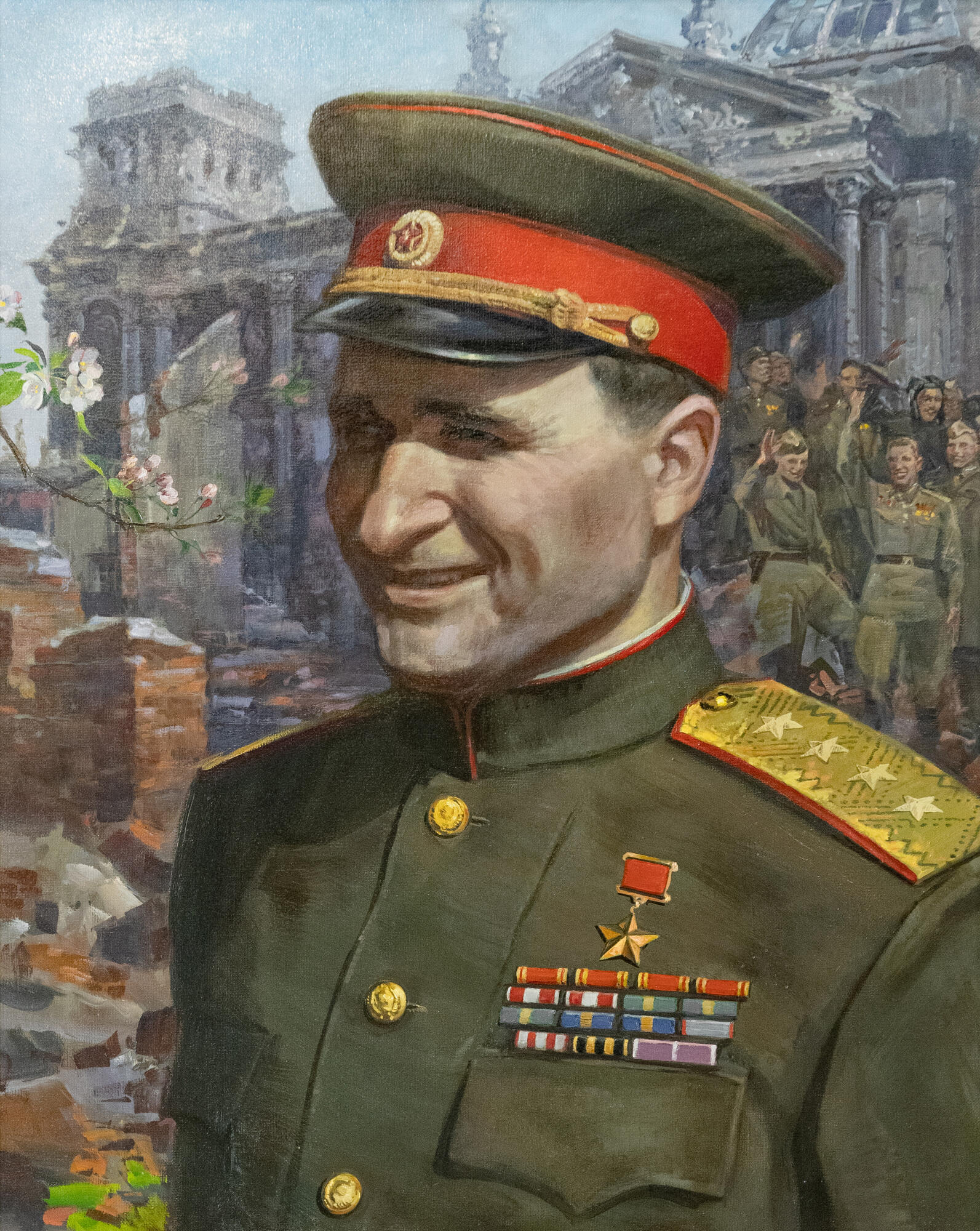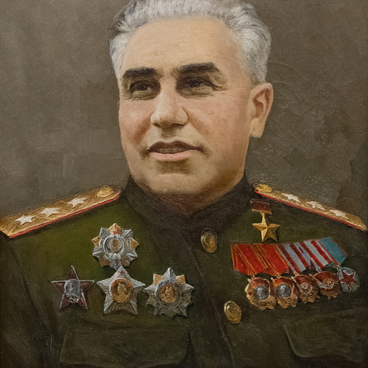Vasily Danilovich Sokolovsky was a renowned military commander and Marshal of the Soviet Union. This portrait was painted by the military artist Alexander Ananiev.
Vasily Sokolovsky was born into a peasant family in the province of Grodno. He graduated from a seminary, and wanted to become a teacher, but his plans were changed by the Russian Civil War. He voluntarily joined the Red Army early on, in February 1918, and dedicated the next fifty years of his life to military service. Sokolovsky fought against the White Guard in the Urals and the Basmachi in Turkestan. He also went through the entire Great Patriotic War.
Marshal Sokolovsky combined the talents of a great strategist and an organizer and was capable of managing the front and planning offensive operations. During the Great Patriotic War, he held all possible staff positions, managing regiments, corps, and districts, and also commanded rifle divisions. Sokolovsky had a unique relationship with the famous military commander Georgy Zhukov. Their contemporaries commented that their different temperaments did not prevent them from getting on well both as military commanders and outside of work.
During various periods of the Great Patriotic War, Army General Sokolovsky commanded the Western, 1st Ukrainian, and 1st Belorussian Fronts, and played an active role in planning and implementing the most important operations, including the Battles of Smolensk and Moscow, the Rzhev-Sychyovka and Rzhev-Vyazma Operations, and many others. He was removed from the position of the commander of the Western Front after several failed offensives in the fall of 1943 and winter of 1944 which were characterized by heavy casualties. The highlights of Sokolovsky’s career were the victory in the Battle of Moscow and the capture of Berlin. On May 1, 1945, he was the one to negotiate on behalf of the Soviet commanders.
For his talented battle management and military valor, Sokolovsky was awarded the title of the Hero of the Soviet Union. He was also awarded the Orders of Lenin, the October Revolution, and the Red Banner, the Orders of Suvorov and Kutuzov 1st class, as well as multiple medals both in the Soviet Union and abroad.
After the war, the valiant commander proceeded to share his experience and develop military science. He wrote several books on military strategy and theory. Sokolovsky was the one who suggested awarding Moscow with the honorary title of the Hero City. He also worked on treasuring the memory of those who died in the war and participated in creating war memorials such as “The Tomb of the Unknown Soldier” in Moscow and “The Motherland Calls” in Volgograd.
Vasily Sokolovsky was born into a peasant family in the province of Grodno. He graduated from a seminary, and wanted to become a teacher, but his plans were changed by the Russian Civil War. He voluntarily joined the Red Army early on, in February 1918, and dedicated the next fifty years of his life to military service. Sokolovsky fought against the White Guard in the Urals and the Basmachi in Turkestan. He also went through the entire Great Patriotic War.
Marshal Sokolovsky combined the talents of a great strategist and an organizer and was capable of managing the front and planning offensive operations. During the Great Patriotic War, he held all possible staff positions, managing regiments, corps, and districts, and also commanded rifle divisions. Sokolovsky had a unique relationship with the famous military commander Georgy Zhukov. Their contemporaries commented that their different temperaments did not prevent them from getting on well both as military commanders and outside of work.
During various periods of the Great Patriotic War, Army General Sokolovsky commanded the Western, 1st Ukrainian, and 1st Belorussian Fronts, and played an active role in planning and implementing the most important operations, including the Battles of Smolensk and Moscow, the Rzhev-Sychyovka and Rzhev-Vyazma Operations, and many others. He was removed from the position of the commander of the Western Front after several failed offensives in the fall of 1943 and winter of 1944 which were characterized by heavy casualties. The highlights of Sokolovsky’s career were the victory in the Battle of Moscow and the capture of Berlin. On May 1, 1945, he was the one to negotiate on behalf of the Soviet commanders.
For his talented battle management and military valor, Sokolovsky was awarded the title of the Hero of the Soviet Union. He was also awarded the Orders of Lenin, the October Revolution, and the Red Banner, the Orders of Suvorov and Kutuzov 1st class, as well as multiple medals both in the Soviet Union and abroad.
After the war, the valiant commander proceeded to share his experience and develop military science. He wrote several books on military strategy and theory. Sokolovsky was the one who suggested awarding Moscow with the honorary title of the Hero City. He also worked on treasuring the memory of those who died in the war and participated in creating war memorials such as “The Tomb of the Unknown Soldier” in Moscow and “The Motherland Calls” in Volgograd.


